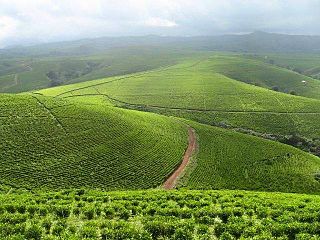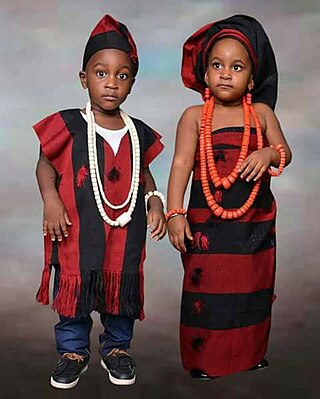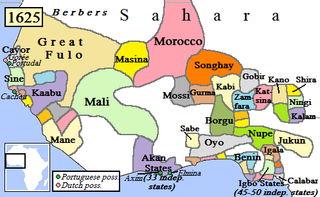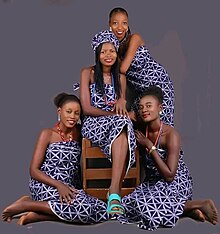
Benue State is one of the North Central states in Nigeria with a population of about 4,253,641 in the 2006 census. The state was created in 1976 among the seven states created at that time. The state derives its name from the Benue River which is the second largest river in Nigeria after the River Niger. The state borders Nasarawa State to the North; Taraba State to the East; Kogi State to the West; Enugu State to the South-West; Ebonyi and Cross-Rivers State to the South; and has an international border with Cameroon to the South-East. It is inhabited predominantly by the Tiv, Idoma, and Igede. Minority ethnic groups in Benue are Etulo, Igbo, Jukun peoples etc. Its capital is Makurdi. Benue is a rich agricultural region; common crops include oranges, mangoes, sweet potatoes, cassava, soya bean, guinea corn, flax, yams, sesame, rice, groundnuts, and palm trees.

Taraba State is a state in north-eastern Nigeria, named after the Taraba River, which traverses the Southern part of the state. Taraba State capital is Jalingo. Its slogan is Nature's Gift to the Nation. The main ethnic groups are the Mumuye, Mambilla, Jukun, Kuteb, Wurkun, Yandang, Ndola, Itchen, Jenjo, Tiv,Fulani,Tigun,And Jibu. The northern part is mainly dominated by the Fulani, and mumuye. The southern parts are dominated by the Jukun, Chamba, Tiv, Kuteb and Ichen.The central region is mainly occupied by Fulani Mambilla, Ndola, Tigun, Jibu, Wurbo,And Daka. There are 77 distinct ethnic groups, and their languages in the State.

Northern Nigeria was an autonomous division within Nigeria, distinctly different from the southern part of the country, with independent customs, foreign relations and security structures. In 1962, it acquired the territory of the British Northern Cameroons, which voted to become a province within Northern Nigeria.

The Idomas are people that primarily inhabit the lower western areas of Benue State, Nigeria, and some of them can be found in Taraba State, Cross Rivers State, Enugu State, Kogi State and Nasarawa State in Nigeria. The Idoma language is classified in the Akweya subgroup of the Idomoid languages of the Volta–Niger family, which include Igede, Alago, Agatu, Etulo, Ete, Akweya (Akpa) and Yala languages of Benue, Nasarawa, Kogi, Enugu, and Northern Cross River states. The Akweya subgroup is closely related to the Yatye-Akpa sub-group. The bulk of the territory is inland, south of river Benue, some seventy-two kilometres east of its confluence with River Niger. The Idoma tribe are known to be 'warriors' and 'hunters' of class, but hospitable and peace-loving. The greater part of Idoma land remained largely unknown to the West until the 1920s, leaving much of the colourful traditional culture of the Idoma intact. The population of the Idomas is estimated to be about 3.5 million. The Idoma people have a traditional ruler called the Och'Idoma who is the head of the Idoma Area Traditional Council. This was introduced by the British. Each community has its own traditional chief such as the former Ad'Ogbadibo of Orokam, Late Chief D.E Enenche. The Palace of the Och'Idoma is located at Otukpo, Benue State. The present Och'Idoma, HRM, Elaigwu Odogbo John, the 5th Och'Idoma of the Idoma People was installed on the 30th of June, 2022 following the passing of his Predecessor HRH Agabaidu Elias Ikoyi Obekpa who ruled from 1996 to October 2021. Past Och'Idomas also include: HRH, Agabaidu Edwin Ogbu, who reigned from 1996 to 1997, HRH, Abraham Ajene Okpabi of Igede descent who ruled from 1960 to 1995 and HRH, Agabaidu Ogiri Oko whose reign took place between 1948 and 1959.
Muri is a town and traditional emirate in Jalingo but covers Karim Lamido LGA ARDO KOLA Yoro, Taraba LGA and others, in northwestern Taraba State, eastern Nigeria, approximately between 9° and 11° 40′ E. and 7° 10′ and 9° 40′ N. The Benue River is nearby, and the portion on the southern bank of the river is watered by streams flowing from the Cameroon region to the Benue. In 1991, the town was estimated to have a population of 56,570. The valley of the Benue has a climate generally unhealthy to Europeans but there are places in the northern part of the province, such as the Fula settlement of Wase on a southern spur of the Murchison hills, where the higher altitude gives an excellent climate.

The Zazzau, also known as the Zaria Emirate, is a traditional state with headquarters in the city of Zaria, Kaduna State, Nigeria. The current emir of Zazzau is H.E Alhaji Ahmed Nuhu Bamalli CFR, who succeeded the former emir, late Alhaji Shehu Idris.

Kororofa was a multiethnic state and/or confederacy centered along the Benue River valley in what is today central Nigeria. It was southwest of the Bornu Empire and south of the Hausa States. They rose to prominence before 1500, were in conflict with their more powerful neighbours in the 17th century, and reduced to a small tribute state by the 18th century. It is believed that Kwararafa was either a confederacy conquest state, led by the modern Jukun people or perhaps a collective name given by their Muslim foes for a number of pagan peoples to their south.
Doma is a Local Government Area in Nasarawa State, Nigeria. Its headquarters are in the town of Doma. Doma LGA houses Special Forces Command, Federal Science and Technical College, Olam Rice Farm and Doma Dam.

Wukari is a Local Government Area in Taraba State, Nigeria. Its headquarters is in the town of Wukari on the A4 highway. The Donga River flows through the area and the Benue River forms a boundary with Nasarawa State to the northwest. It has an area of 4,308 km2 and a population of 241,546 at the 2006 census. The postal code of the area is 670.
Gassol is a Local Government Area in Taraba State, Nigeria. Its headquarters are in the town of Mutum Biyu on the A4 highway at8°38′00″N10°46′00″E.

Nigerian traditional rulers often derive their titles from the rulers of independent states or communities that existed before the formation of modern Nigeria. Although they do not have formal political power, in many cases they continue to command respect from their people and have considerable influence in their community.
The Wukari Federation is a traditional state in Nigeria, a successor to the Kwararafa state of the Jukun people. The state is based in the town of Wukari in Taraba State, in the south of the Benue River basin. The ruler takes the title "Aku Uka".

The Kuteb people are an ethno-linguistic group in West Africa, who speak Kuteb, a Jukunoid language. Most of the Kuteb people reside in Taraba State, Nigeria.

The history of Northern Nigeria covers the history of the region form pre-historic times to the modern period of Northern Nigerian state.
The kingdom is dominated by the Yankam people who have eventually lost their language to Hausa. located in the southern zone of plateau in Wase L.G.A is a district known as Bashar.The town regard their chief as REKNA due to the history of their language. the town is known of a population of over 32,000 peaceful people. The people have made it easy for Late ALH. Adamu Idris to rule them for 59 years who's during his reign was assisted by his son Yusuf Adamu Idris because of old age. late Rekna of Bashar Alh. Adamu Idris died at the age of 96 and succeeded by his younger brother His Royal Highness Alh. Abdullahi Idris Isa the last born of the family of late Rekna Alh. Idris Isa of blessed memory. The history of Bashar have been tapped from different sources as expressed below.
Kanajeji Dan Yaji, known as Kanajeji, was the 13th ruler of Kano and, for a period, the ruler of Zazzau. He reigned from 1390 - 1410. Like his father, Yaji I, Kanajeji was an intrepid king whose reign was characterized by war, conquest, and religious reformation. Kanajeji engaged in two long and pivotal wars with Umbatu and Zazzau, and eventually prevailed in both, after lengthy feuds. He took Umbatu in four attempts, and Zazzau after two battles. He also renewed the suzerainty his father had imposed over the Kwararafa. However, in a bid to conquer Zazzau, his reign also saw the return of the pagan practices his father sought to expunge. He is credited with revolutionizing Kano's army through the introduction of quilted leather armors (lifidi), steel armors, coats of mail, and iron helmets.
The Zaki-Biam massacre was a mass execution of hundreds of unarmed Tiv civilians by the Nigerian Army between 20 and 24 October 2001. The massacre was a surreptitious operation of the Nigerian army to avenge the killing of 19 soldiers, whose mutilated bodies were found on 12 October 2001, near some Tiv villages in Benue State. The massacre took place in villages including Gbeji, Vaase, Anyiin, Iorja, Ugba, Tse-Adoor, Sankera, Kyado and Zaki-Biam.
Kuvyon II was the 27th Aku Uka of Kwararafa and 13th since the founding of the Wukari Federation, a Jukun tradition state in Middle Belt, Nigeria. He is also the chairman, Taraba State Council of Traditional Rulers and Chancellor, Federal University Dutse. He died on October 10, 2021, at the age of 84.
Usman Danjuma Shiddi is a Nigerian politician and legislator currently representing the Ibi/Wukari Federal Constituency of Taraba State at the Federal House of Representatives in Nigerian National Assembly. In 2019 he won the House of Representative seat with 39,312 votes defeating his closest rival, Yakubu Aliyara of Action Alliance (AA) who got 22,147 votes. Shiddi is the Chairman House Committee on Internal Security of the 9th Nigeria House of Representative Assembly and in 2020 defected to the All Progressives Congress.
The Nwonyo Fishing Festival is a festival celebrated by the Ibi people in Taraba State, Nigeria. The lake is located 5 kilometres North of Ibi community, it is an annually celebrated festival where Ibi and its neighboring community comes together to fish and re-unite. The lake is said to be the largest in west Africa as it run 15 kilometres to the Benue River. The name Nwonyo means Hide-out for huge and dangerous aquatic Animals such as Crocodiles, Snakes, Hippopotamus and many more.













